Text
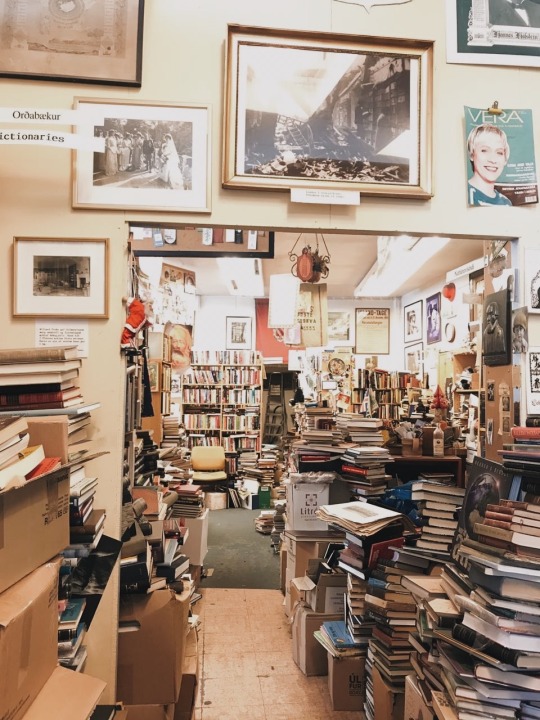
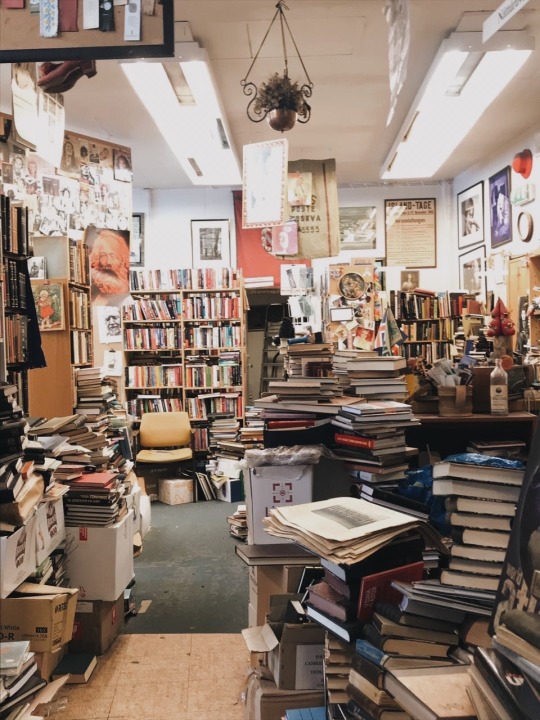
Bookshop spotted during an evening walk in Reykjavik
22K notes
·
View notes
Text
How to Write a University-level Essay
Heyo, so school is fast approaching, and seeing as Tumblr is made up of a lot of younger users who will soon be shipping off to college or university soon, I thought I would take it upon myself to help spread my knowledge of essay-writing. Essay-writing is my thing. I love it. I live for it. It’s how I make up for my shitty test marks, and still get by with an 85 average+ in University classes. I’m a historian by trade, so perhaps this information will seem a bit off from what you’re used to, but hopefully, It’ll help you out. If you have any questions, feel free to shoot me an ask.
1. Consider your question and find your thesis.
I know, I know. People always say, no! Never start with your thesis/intro paragraph! Go to the body!! Well i’m here to say forget everything you’ve been told. Forget that, forget the stupid hamburger shit they teach you, forget it all and start reading.
I ALWAYS start with my thesis. Why? Because you cannot make good paragraphs without knowing what you’re researching. You need direction, and a thesis is your map.
So, the question we’ll use shall be: What is one way in which the Union won the American Civil War?
Now remember, your thesis is your map. It shows you where to go, what to look for. The thesis is the heart and soul of all your work. You want a good, solid thesis. What does that include, you ask?
An idea
A reason for said idea
Evidence to support said reason, and thus validate the idea.
So, lets do an example. Let’s say I’m writing on the use of media during the American Civil War. I like photography, and wrote a paper on this in my second year, but im gonna be doing this example freehand(idk where I put that essay lol) so lets work with how I got an A+ on that paper. This will be my idea:
“Photography during the American Civil War influenced the war’s outcome in the Norths favour.”
This is VERY vague. This is an example of a thesis in bloom! Let’s take it further. Look at the above. What questions would you have from this thesis?
-Who was taking photos at that time?
-Why did it influence the outcome?
-How did it influence the outcome?
-Who consumed photography as a media at that time?
This is where you STOP, and start the next step.
2. Research
Start your basic research with your idea, and the above questions in mind. Look at libraries, ask your professor or TA or librarian, or just do some basic google searches to get to know the subject(but for the love of god if you include a google link in your citation I will personally hunt you down and castrate you.)
I like to start with the basics of any inquiry: WHO, WHAT, WHERE, WHEN, WHY, HOW. Who was taking photos? Where were they displayed that caused influence? ect…These, in relation to your beginner thesis, will help guide you in what form your thesis will take.
Once you’ve finished that, and have a general feel for the time period, go back to your thesis.
3. THESIS 2.0
Go back to your original question: What is one way in which the Union won the American Civil War? Now look at your thesis again. It’s too vague, isn’t it?
As you can see, our original thesis was too vague to be a real thesis. So, we NARROW IT DOWN using our WWWWWH progress we focused on during early research!
“Photography during the American Civil war influenced the war’s outcome by providing a visual for ordinary citizens about the horrors of war, and thus helping to increase donations and awareness to the cause.”
Great! But once again, too vague! Questions that may arise include:
Who was taking the photos
Evidence for donations?
Evidence for social awareness?
So, we NARROW IT DOWN again. I’m going to use Andrew Gardner’s photography during the Civil war, as he was one of the most famous and influential at the time.
“Andrew Gardner’s photography during the American Civil war influenced the war’s outcome by providing a visual for ordinary citizens about the horrors of war, and thus helping to increase donations and enlistment in the Union through awareness to the cause…”
The above then gives us the following(why and how are sometimes grouped together):
Who: Andrew Gardner
What: Photography helped the north win the war.
Where: Union-aka northern states
When: American Civil War
Why/How: Because Andrew Gardner’s photography raised social awareness through this new and budding medium
Use this sort of outline to guide you in the next step!
4. Now that we have a thesis, you need to do some more research and evidence gathering.
The way I like to do this is to go check out a few books from the library(look for text books in particular), and leaf through the index for matching terms. Our matching terms would be:
Photography, civil war, Andrew Gardner, media
From there, you read over the pages, and see if any of the info relates to your subjects. Copy down quotes, page numbers, book title, author, publishing date and publisher. You need these for your bibliography. Pick and choose relevant information. The filter for relevant information relies entirely on your thesis, because it decides what you need to be looking for—this is why I hate when people tell me to start writing paragraphs before I write a thesis! It’s simply impossible and counter productive, and will cost you hours in revision.
So, gather your information from the library, and cross-reference with peer-reviewed articles and data. For our thesis, we would need data on enlistment numbers in an area after a date of Andrew Gardner’s photography exhibit showcases. No matter what type of essay you’re writing, you can always back up your evidence with data, and it won’t hurt one bit. Don’t be afraid of the numbers, kids!
So, if we were to go back to our thesis, we could now expand on it like this:
“Andrew Gardner’s photography during the American Civil war influenced the war’s outcome by providing a visual for ordinary citizens about the horrors of war, and thus helping to increase donations and enlistment in the Union through awareness to the cause. An increase in donations and enlistment in relation to exposure to Gardners work is seen in data/evidence point A, as well as in data/evidence point B, which will be fully outlined in the points below.”
This gives you an example of how to lead from a thesis, to your opening paragraph.
5. Data and Evidence Justifications–Paragraph making
This is the section where you can branch your essay into your data and evidence points you gathered in steps 2 and 4. You can have as many paragraphs as you like, just make sure your evidence and data is strong and supported. I personally like to work with my thesis copied and pasted onto the top of every page I write on. This keeps you on track, with your clear goal in mind, and will help you from straying. I will give you an example of how a paragraph might sound.
Andrew Gardner’s photography during the American Civil War became heavily influential upon the American population at the time, particularly the north, wherein which his work was showcased. The influence of Gardner’s photographic works is seen in the _____, which shows us that without the influence of Gardner’s media influence, war efforts and awareness may not have been as successful as they had been.
This is an alright opener for you to work with. The ___ is where you could put in your data point or evidence piece. The point of the paragraph is to show your support for your thesis by confirming it with evidence.
Your paragraphs should take this form:
Present, Confirm, Conclude, Lead.
You present your evidence, confirm its relation to the thesis and confirm the validity of the thesis, conclude by brief revision of evidence, and then lead into your next paragraph.
6. Conclusion
Your conclusionary paragraph should be a look-over of the above paragraphs. Restate your thesis, present a summarized version of your paragraphs(one or two sentences only), and perhaps take the time to look at your own views on the subject. An example might look like this:
“Taking a moment to step away from the above mentioned evidence, I believe it to be scholarly acceptable and even necessary to state my own views on the subject presented. In drawing conclusions, I felt that the above information was correct in that it presented a reality of the time period, in which photography was becoming a medium to be embraced by popular society. People were not only astounded by Gardner’s photographs on a social level, but also a technical level. The astonishment people held at seeing the war-torn battle fields spurred them into action, and even today can still present feelings of dread, fear and loss when looking at his photos…blah blah blah”
Why is it scholarly acceptable and perhaps necessary to state your views? Oftentimes, it is to reassure the reader of your own personal bias’, which exist whether you like them or not, to the subject at hand. Having a small tidbit on your own thoughts about your research ect, breaking away from the third-person droning of an essay can be refreshing and welcoming for a prof at the end of his stack of essay reading.
7. In summary
Thesis
WWWWWH
NARROW IT DOWN
Data and Evidence
Present, Confirm, Conclude, Lead
Self opinions/Conclude
All in all, do unique things. Professors love it when they come across something that’s not cookie cutter! Even if they present you with a list of essay topics, take the leap and ask them if you can do your own research topic!! Take risks with your essay writing, talk to your professors about what you want to do, and try to have fun with your research. I’ve written on everything from civil war photography to Disney princesses in american media, to the religious formation of idea of heaven and earth. Remember, so long as there’s credible, documented evidence, it’s possible to write about it.
56K notes
·
View notes
Photo
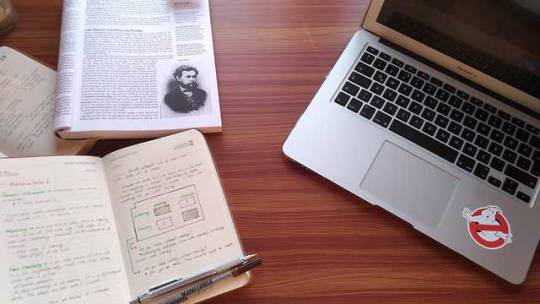
Studying psychology again..
#psychology#studyblr#studyspo#study inspiration#study motivation#studygram#study notes#psychologyblr#philosophy#philosophyblr#learning and memory#ghostbusters#study space
311 notes
·
View notes
Photo
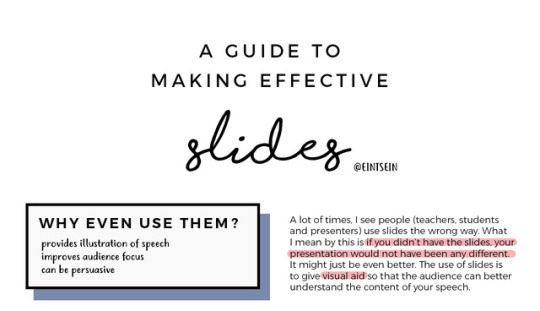








A GUIDE TO MAKING EFFECTIVE SLIDES aka how to create presentation slides that actually improve your presentation
By Eintsein
(apologies for the variation in image quality. idk what went wrong with tumblr)
38K notes
·
View notes
Photo


First reading of the semester, I'm so excited!!
This reading is for my PSY222 class where I study learning and memory. The book I’m using is Learning and Memory from Brain to Behavior by Mark A. Gluck
#learning#memory#psychology#philosophy#studyspo#studyblr#study motivation#studygram#study notes#study space
15 notes
·
View notes
Text
04.02.2019
Sometimes talking about the constant thoughts wandering in our minds that gives us anxieties, to our friends does not stop these thoughts. We still think about our worst days when we are trying to go to sleep or do an important assignment. I have been suffering from these mindfucking thoughts since forever but nowadays they hurt me more than ever. I feel like my life is going downhill and I can’t do anything about its reasons but to think about them. Thus, today I tried something new for myself. I used to write my problems to my diary or tweet them -it’s silly I know- but it never helped me completely, because I was always afraid that someone sees them or understands them. I was afraid to show people my weak sides thus I couldn’t help myself completely. I told all my weaknesses to the person who can help me the most and only: Myself. Tonight I talked to myself out loud. I told myself my own problems, especially the ones I need to face myself. I cried while talking to myself. However after a while I gained confidence about my problems. I tried to find solutions, I tried to comfort my mind, but most importantly I tried to believe in myself. When I only think about the problems, I tend to think only about the worst in them: the problem itself; but when I said all those terrible things to my own face, I tended to find better solutions for them because there were no place to escape anymore. Our mindpalace is abstract and we have a lot of place to run and hide, but our voice is concrete and it is in front of us: we have no chance but listening.
2 notes
·
View notes
Text


So, it’s been a hard day for me and I’m just trying to cheer myself up by putting silly lights around and watching some movies. I have prepared myself a nice salad and tried to enjoy the night more.
*The notebook behind my pc is the notebook I write down all the movies I watch and it has a great importance for me.
11 notes
·
View notes
Text
yesterday I went to shopping to IKEA with my friends and bought myself gifts for surviving these hard days, this plant and these candles are ones of them, they look so cute!

5 notes
·
View notes
Photo

day 9/20 of productivity
❅ mind over matter - young the giant
12 notes
·
View notes
Photo


academic update: there are 3 days left for course elections and I’m so excited! I want my 2nd semester to start right now. However, there are still lecturers that haven’t published their course hours so I don’t know how will my schedule is going to look exactly. I want to take German 101 but I’m not sure if I would be able to add it to my schedule! Fingers crossed.
mental update: I feel better nowadays, I meet my friends I read lots of books, I try to write essays to make my brain work, there is a little left for my semester so I’m doing my best to keep my shit together.
16 notes
·
View notes
Photo


academic update: there are 3 days left for course elections and I'm so excited! I want my 2nd semester to start right now. However, there are still lecturers that haven’t published their course hours so I don't know how will my schedule is going to look exactly. I want to take German 101 but I'm not sure if I would be able to add it to my schedule! Fingers crossed.
mental update: I feel better nowadays, I meet my friends I read lots of books, I try to write essays to make my brain work, there is a little left for my semester so I'm doing my best to keep my shit together.
#study space#studyblr#study#studyspo#study inspiration#study inspo#reading inspiration#readblr#mental updates#academic updates#inspirational#studygram#study motivation#candles#reading space#critical reading#late night readings
16 notes
·
View notes
Photo

day 9/20 of productivity
❅ mind over matter - young the giant
#studyspo#study inspiration#study space#reading inspiration#studyblr#studygram#study notes#study motivation#student#college stuff#college studyblr#college struggles#candles#reading space#reading goals#late night readings
12 notes
·
View notes
Text

Hello, rayslablr here!
First of all, I want to apologize for being inactive these days but it has been chaotic with a lot of assignment from university that I didn’t find the time to post original content in here. Secondly, just a disclamer: this are the things I do, they might not be any help for you but you don’t loose anything with trying besides it can motivate you to find what really works for you.
As students is common that we sometimes don’t have the time to properly study and do our assignment correctly hoping we get a good grade, but that is because we have other extracurricular activities to attend. Maybe you have intruments lessons, or you have choir practices or any sport practices, or perhaps you work and study at the same time.
Having so many things to do you sometimes try to schedule but end up leaving some stuff to work at night. That is totally fine, some people are more in the morning side and other in the night time side (I’m more of the last one)
Planning for a productive night doesn’t mean having an all-nighter, I don’t recommend that at all because is not healthy for the body and your mental health. Even though you might think that you get all your tasks done, what happens after that night? What are the implications for the next day? So for that I give you a few tips that might help when have tasks to do at night:

Before I begin, let’s talk about what is productivity?
PRODUCTIVITY:
According to the Merriam-Webster site, productivity is “the quality or state of being productive.”, and what’s productive? As state in the same site being productive is “yielding results, benefits, or profits”; “ yielding or devoted to the satisfaction of wants or the creation of utilities”
For the Cambridge Dictionary site, productivity is “the rate at which a person, company, or country does useful work.”
Finally, as indicated by the Business Dictionary, productivitu is “a measure of the efficiency of a person, machine, factory, system, etc., in converting inputs into useful outputs.”
What we can gather from these concepts, roughly and vaguely, is that productivity not necessarily has to be associated with doing homework or any kind of assignments, it can also mean doing one push-up, making the bed, walk or breathe exercises, and endless other things. Being productive means that we’re using out time wisely by focusing on what matters.
SKINCARE:
I know that sometimes skincare is the least of our problems, and after studying at night we feel exhausted that we forget to wash our face. It has happened to me a lot and I truly regret it. #AcneHasEnterTheChat
By doing your skincare night routine you start to feel good that you are taking care of yourself, and that idea of productivity can motivate you. So keep it going while you’re still active. Do your skincare routine after having dinner or any other extracurricular activity, that way you can start fresh with your productivity process. The sooner you’d do it you have another less thing to worry about so you can properly focus.
When you splash yourself with water your brain actives because your skin is warm so water cools it down making you relax and it awakes you. Take that opportunity to stay active so you can take your time and divide it for things that matter.
Side Note: Always wash your face with lurkwarm water!!
Side Note 2: If you ever want a blog about skincare let me know because I really love that topic and I’m all for it
COMFY OUTFIT:
Pajama. Shorts. Sweater. Underwear. What ever you feel comfortable with. But never do things in your bed if you really want to work on something otherwise you’ll fall asleep.
This is simple. Just wear an outfit where your body doesn’t feel tight or uncomfortable, where you can stretch and feel relax. It has happened to me many times where I forget to change clothes and start working with my jeans, long shirt and shoes on, after a few minutes I get up from my sit and try to stretch without success and I keep doing my work; after other minutes I do the same and that is just distracting me more, so after a long moving day imagine how your body would feel.
Imagine getting inside a narrow hole, how do you feel? It feels uncomfortable, like you need air or you need to move, well that is how your body feels. At night. After all of the activities you did throughout the day. Tired
So let’s make it easy, just change! That way you won’t get distracted or focus your attention in moving around or trying to find the a comfortable spot to work.
PRIORITIZE
We led busy lifestyles meaning that not every activity we have would be completed so don’t feel bad about that. Plan ahead of time, and know which activities you will leave for the night. Be realistic, it’s night time, you’d feel tired so don’t give yourself a lot of tasks, and if you have one big activity divide it into mini tasks so you don’t overwork past your limit. Every day review your list of tasks or your to do list and figure out the importance of each one of them. Figure out if all of them are worth your limited time and energy, you don’t necessarily need to pull an all nighter.
A tip for you is to organize your activities by categories, this allows you to recognize which task is more important than the others. What I like to do is an ABCD categories, meaning:
A: Crucial –> I need to do this right now
B: Less important –> I can do this in a few hours
C: I shoul get this done –> Essencial task but I can do it tomorrow
D: I still got time –> I can do it the day after tomorrow or next week
This way you can analyse which tasks you can leave for the night and which ones you’ll do in the morning.
Another tip is giving yourself a time limit to decide until what time you will have your work done. This works for me, it might not work for you, but I always tell myself to stop working (even if I haven’t finish) around 11 pm max. so I could sleep more and don’t get exhausted. By the way, this also helps for your skincare; your skin cells start rejuvenate at 10pm and stops at 2am the next day, so it’s a way to help your skin stay fresh, young and healthy.
HYDRATE
This one is simple, JUST DRINK WATER!! There’s nothing more to say, water helps you stay energized and that transforms in motivation to be productive. So give your body a happy boost you’ll thank yourself later.
Here are some beverages that helps you stay hydrated in case you want to try different things.
WET RAG
Get any rag you find, get it wet then squish it to take away the excess of water, next put it in your freezer and wait 20-30mins after that put it around your back side of your neck and that is everything you need to do! Very simple! Now, why?The back of your neck absorbs the heat of the environment quicker than any other part, and by doing that you get agitated or some kind of discomfort because you’re warming your body so it gets relaxed to a way of tiredsome.
So if you put around that area a cold wet rag you make your body cool down and helps you improves your circulation, ease stress and increase the alertness, in short words it keeps you active. Think about this: when you shower with lukewarm or cold water it wakes you up inmediatly and that is what happens with the wet rag but in a minor scale.
If you ever heard of the myth: “If you feel sleepy get your face wet”, well that is true, you wake up when you splash water to your face but sometimes that effect only lasts for a few minutes, if you want the whole experience put it in your neck for at least 15 minutes.
Another benefit of this, that you can do it at any time you wish, is that a heated neck is a big enemy for the pores. When your neck is hot it inscreases your natural control sebum making your pores enlarged which leads to wrinkles, pimples and more, so try this! Try putting a cold wet rag around the back of your neck because is very benefitial!
POMODORO
You heard of this before. You can work for 25 minutes and take a break of 5 minutes, this completes the cycle and this 30 minute period is then called a “pomodoro.” After four pomodoros, you take a longer break (15-30 minutes). Of course, the great part about ths method is that you can custumize it to your liking; you can take more time (without excessing) or less time if you are in a hurry. There are a buch of app you can search in the app store (I use Forest because not only it helps you not procrastinate but you’re helping the world by planting real trees) and even google extensions when you’re working in your computer.
Here are other blogs that can help you understand this method:
“The Pomodoro Technique” @studious-simplicity
“How to: my pomodoro technique” @aestaeric
That is everything that I have for today, I hope these tips are somehow a help for you and that you have lots of days full with productivity and happiness which is the most important.
rayslablr out!
495 notes
·
View notes
Photo


How do you motivate yourself to study while you are sick? Send me some recommendations 💛
#studying#studyspo#study inspiration#study space#back to school#philosophyblr#philosophy#philosopher#studyblog#studyblr#studygram#study motivation#view#study view#follow#original content
229 notes
·
View notes
Photo

hello pals!! this is a masterpost of half (or so) of the reference posts i reblogged/made. i tried uploading this masterpost as just one big masterpost but i had over 250 links so that failed and here i am again. here is part one, encapsulating studying + certain subjects which will be followed by part two (slightly more general) here! enjoy ✨
studying, school, + learning
what i’ve learnt throughout my years of being a student
notes, studying, and self-study resources
self-study resources
starting a studyblr
college + uni
how to get studying
online study guides
good habits
exams!
study management
school is starting soon
back to school (1)
back to school (2)
back to school (3)
back to school reminders
50 things to know for back to school
get prepared for a new school year
school resources
final grade calculator
writing emails to professors
cheap textbooks etc!!
save money on textbooks
school
first week of school stuff
testing effect
make studying fun
high school tips
101 study tips
types of learners
lazy kid’s guide to good grades
catching up on missed work
university tag
igcse resources
sat tag
act tag
ap tag
ib tag
a-level revision tips
diy school supplies
test taking tips
a complete guide to studying (well)
time to study!
groupwork (1)
groupwork (2)
tips tag
study effectively from textbooks
studying better
surviving your least favourite class
studying a subject you hate
success
doing research
understanding the question
pomodoro
study tips
tactile learning
how to concentrate
concentration
exam day
ultimate study masterpost
study tips for exams
school survival
studying on the go
how to read academic journal articles
how to study smart
how to remember anything in 3 steps
distraction-free studying
motivation
my study instagram + study blog
+ motivation links
motivation masterpost
stay motivated
get that homework done!
reaching goals
getting motivated
motivation through anime
writing
writing tag
recover an unsaved draft
uni writing resources
add citations!
annotating (1)
annotating (2)
advice for writing papers
writing helps
essay writing tips
how to write an essay
writing term research papers
active vs passive voice
writing masterpost
academic writing resources
essay checklist
reduce your word count
essay writing links
how to write and execute a huge piece of work
summary writing
the discursive/argumentative essay
the narrative essay + the descriptive essay
note-taking
note-taking in class
cornell note-taking
cornell (2)
lecture notes
illustrating notes
banners
maintaining good notes
note-taking
sticky notes
flashcards
colour-code + highlight effectively
colour-coding
studying from textbooks
study guides
upgrade your notes
illustrate your notes
mind maps
note-taking for different lecture types
ribbon drawing
smart highlighting
lettering ideas
how i take notes
note-taking tips
aesthetically pleasing notes
fake cursive notes
languages + literature
the ultimate english masterpost
shakespeare
literature masterpost
annotating
studying a foreign language
100+ legal sites to download literature
approaching poetry analysis
write a killer unprepared text essay
literary analysis research papers
classics
how to ace lit
reading lit
write a rhetorical analysis essay
practice oral comprehension!!
how i study for english lit
poetry analysis (1)
poetry analysis (2)
how i learn languages
self-studying languages
languages tag
how to open a new book
literary devices
literaty devices w/ printables
literature masterpost
grow your vocab
a guide to vocab
language learning tips + resources
SUPER IMPORTANT FOR POLYGLOTS
tips + tricks for learning a language
chinese
english
french
german
greek
italian
japanese
korean
latin
maltese
polish
russian
spanish
swedish
humanities + other subjects
studying humanities subjects
gathering materials for a humanities research paper
philosophy
philosophy tag
psychology tag
politics + government
women of wwi
ap world history
coding
design resources
sciences + math
how to memorise diagrams
biology (1)
biology (2)
studying biology
biology help
biology note-taking
anatomy + physiology
physiology
physics
ap physics
chemistry (1)
chemistry (2)
chemistry note-taking
studying chemistry
maths tag
how to study for math
how to study math (1)
how to study math (2)
math (1)
math (2)
math (3)
10 tips to excel in maths
avoid carelessness in calculations
succeed in math without really trying
math resources and links
algebra (1)
algebra (2)
precalculus
geometry
space + astronomy (1)
space + astronomy (2)
hope this helps + please check out part 2 as well!! ilysm 💗
ps here is a list of all my masterposts just in case 🐝
- helena xx
39K notes
·
View notes
Text
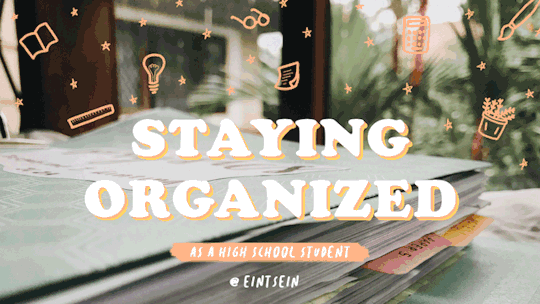
Hey guys, so I’m nearing the end of my senior year, and it’s been great so far! I accomplished my academic tasks efficiently and didn’t burn myself out, and I think the main contributor to my success as a student is my organization system. This system has been refined throughout my high school years, but I think now I’ve finally found the most effective methods.
Please remember that this isn’t the only organization system you can adopt; this is just the one that works the best for me, and I hope that by sharing it with you, you’ll gain a new perspective on how to stay organized as a high school student.

The first thing I wanna talk about is my notebook system, which I briefly mentioned in my Guide to Note-Taking.
My notebook system comprises three types of notebooks: the Everything Notebook, the subject notebook, and the revision notebook.
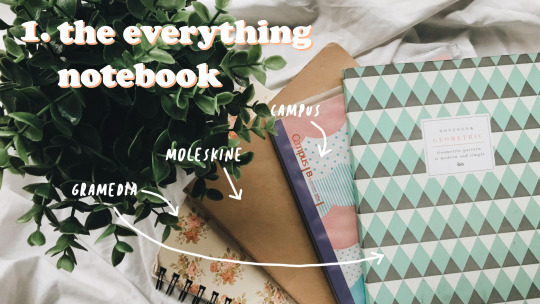
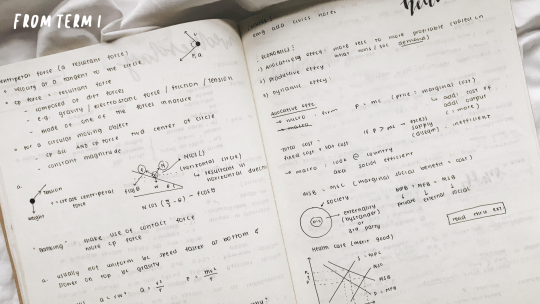
The Everything Notebook
The first stage is in-class notes. I only bring one notebook to school every day. I call it my Everything Notebook, and this is where I write down all of the notes I take in class. This way, I don’t have to lug around six notebooks where I’m only going to use a few pages in each of them that day.
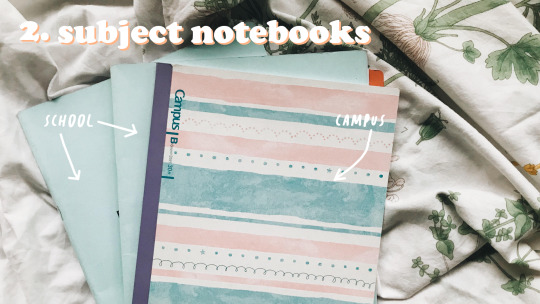
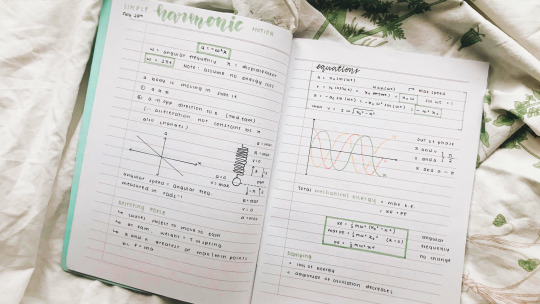
Subject Notebooks
At the end of the day, I would revise my notes and compare them to the syllabus so I know where we are in the learning process. I would then transfer my class notes from my Everything Notebook to my different subject notebooks. This is stage two. I also start to jazz up my notes because I use the notes in my subject notebooks to study for tests.
In addition to my class notes, I include material from my teachers’ notes that they might not have elaborated on, as well as points in the syllabus (I’m currently taking A2) that were only glazed over briefly, or not at all, in some cases. (Note: this does not mean they completely skip a chapter or topic; it’s more like they missed a few bullet points that should be in my notes but aren’t. An example would be if we’re learning about phenol reactions and the teacher forgot to mention the use of FeCl3 as a test for phenol.)
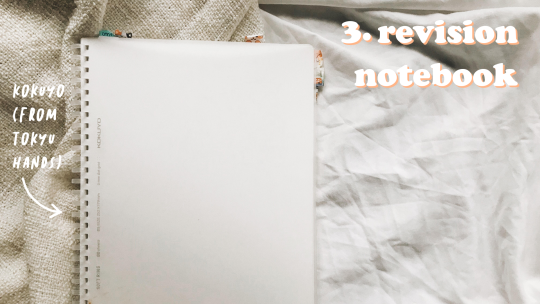
Revision Notebooks
Stage three comes a little later, when exam week is just around the corner. Essentially, I rewrite and improve my notes from my five different subject notebooks into a single revision notebook or binder. (Recently, I’ve opted for a revision notebook because they’re lighter and easier to carry around.)

Because my teachers don’t always teach in the order of the syllabus, the first thing I do is organize my notes according to the syllabus. I would then fill in any other missing gaps in the material that hadn’t been filled in stage two.
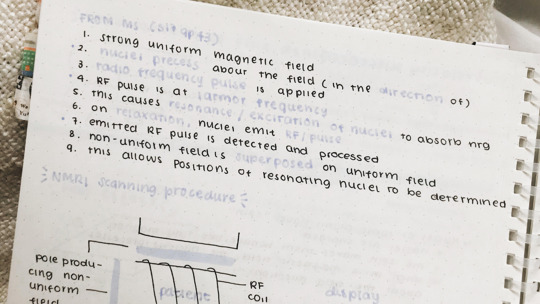
When compiling material for my revision notebook, I use as many sources as possible: my own notes, my teachers’ notes, youtube videos, online sites, and my favorite, the mark scheme! I add in some answers from past papers (explanations only, so no calculations) mainly to secure marks. It’s safer to memorize definitions straight from the mark scheme than from the textbook or from handouts. I also do this to ease my memorization, especially for topics that require lengthy explanations. It’s a lot easier to remember the 6 points I need to explain the principles of NMRI than to remember everything in the four-page handout my teacher gave me.

Folders and binders are essential to organizing your papers. Some people keep a single accordion folder for all their papers, but for me it’s just too heavy to carry around all the time. The same goes for subject folders that are brought to school every day.
Instead, my binder/folder system comprises my Everything Folder and my subject binders.
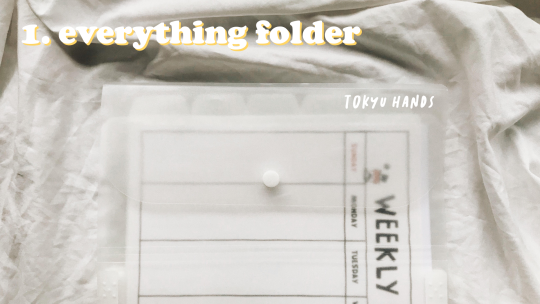
The Everything Folder
The folder I carry with me to school every day is this A4 folder I got from Tokyu Hands. It has 5 pockets, one for each day of the week, so all the papers I receive on Monday will go behind the first divider, and so on.
Some people also keep blank papers in their folders; I don’t because my school has its own lined paper and graphing pads that I keep under my desk that I use if a teacher asks us to do an assignment on those papers. If I do work at home, I prefer to just use a plain A4 paper or a legal pad.
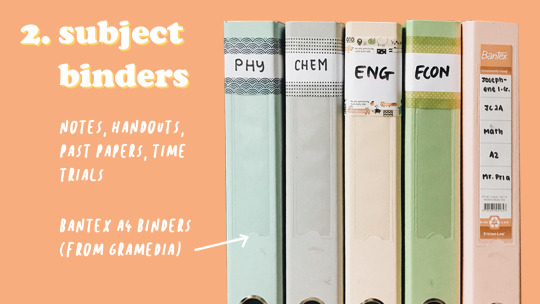
Subject Binders
At the end of the week, I’ll sort my papers into my subject binders. Sometimes I’ll keep some papers in the folder if I think I’ll be needing it the next week. This usually only applies to worksheets because all my teachers’ notes are available on Google Classroom, so I can access them even if I don’t physically have them.
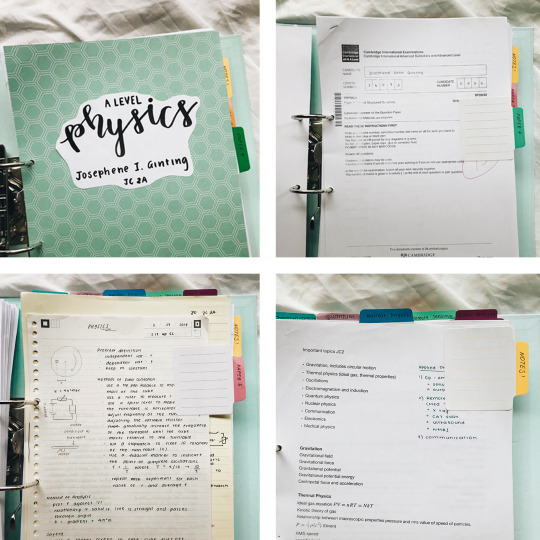
Each of these binders have sections inside them:
Physics: 1 for handouts, notes, and tests, 1 for Paper 4 (Theory), 1 for Paper 5 (Practical Planning). I included extra tabs to mark the different topics in the handouts section.
Chemistry: same as Physics.
Economics: 1 for Paper 3 (MCQ), 1 for Paper 4 (Case Study and Essay). A lot of my Economics material is online, though.
English: 1 for Paper 3 (Text and Discourse analysis), and 2 for Paper 4 (Language Topics, which includes 1 for Child Language Acquisition, 1 for World Englishes). Past papers, handouts, and notes all go under their respective topics.
Mathematics: I just keep everything together because I never revise math and just constantly do past papers.
This makes it easier for me to revise each subject because I can just take one binder with me instead of a messy folder with everything just shoved in there.

I keep a magazine file for each of my A-Level subjects (English and Mathematics are combined). All my textbooks, revision guides, and subject notebooks are kept here, so if I need to revise one subject, that’s the magazine file I’ll take out.
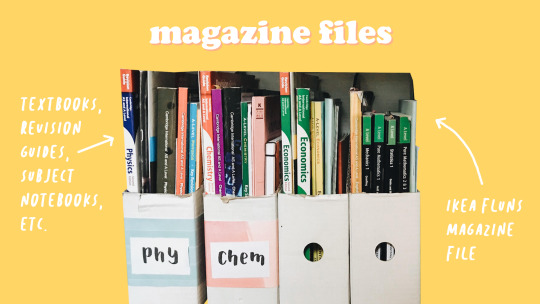
These magazine files prevent any small things (like my book of flashcards) from being shoved to the back of my bookshelf, or materials from different subjects from getting mixed up.

In my senior year, I mostly plan using this app called Edo Agenda. It syncs across all my devices for free and has all the features I need: a to do list to organize tasks, monthly and weekly calendars to organize events, a journal to organize notes and memos.
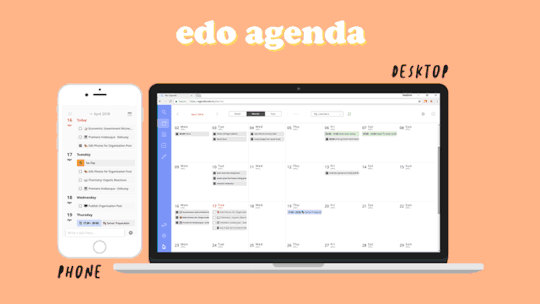
I used to bullet journal regularly, but it takes too much time during weekdays, so now I just bullet journal for the therapeutic effects it gives me, and I use an app for organizing tasks and events. Sometimes at the end of each week, I’ll transfer my tasks to my bullet journal and then decorate the page, but again, this is just for its therapy.

Organizing your school supplies is just as important as organizing your papers and notes. With a more organized backpack and pencil case, you won’t waste time looking for your things at the bottom of an abyss.
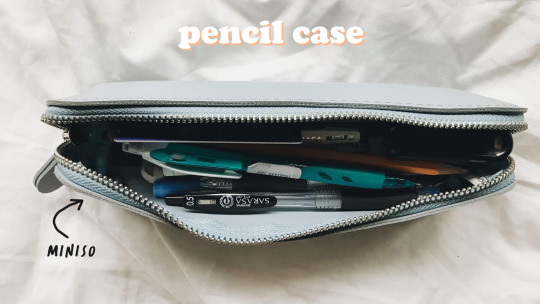
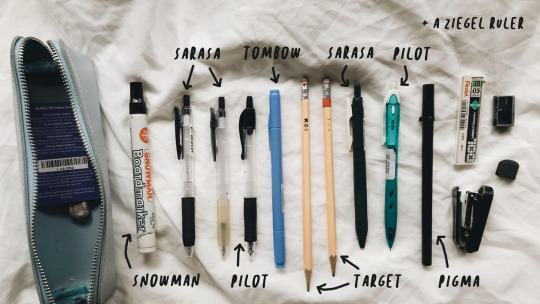
Pencil Case
I don’t find it necessary to bring so much stationery to school unless I plan on making notes at school (usually during revision week).
Backpack
Because we’re already in the revision term, I don’t really carry a lot of things in my everyday backpack, just the following:
Pencil case
Everything Notebook
Everything Folder
Revision notebook
Kindle
Phone
Wallet
Earphones
Calculator
Speaker
Drinking bottle
A pouch with things like a hairbrush, pads, and lip balm
And that’s all for now! I hope this post will help you organize your school life (if you haven’t already) or at least provide some useful insights on some ways to stay organized as a high school student.
45K notes
·
View notes
Text
yesterday I went to shopping to IKEA with my friends and bought myself gifts for surviving these hard days, this plant and these candles are ones of them, they look so cute!

#study motivation#study notes#study space#studygram#studyblr#studyspo#philosophy#reading#inspiration#philosophyblr#reading space#reading inspiration#plant#ikea
5 notes
·
View notes